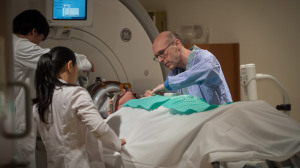by
Thomas Dworetzky, Contributing Reporter | May 03, 2017

An anesthetist and imaging researchers
prepare research participant Rick Karr
for his procedure.
Photo by Kevin Van Paassen
Canadian scientists have begun clinical trials using focused ultrasound to breach the blood-brain barrier temporarily in patients with Alzheimer’s disease.
A safe, noninvasive way to open this barrier could prove key to “properly testing” future drug treatments for Alzheimer's, according to Dr. Sandra Black, who holds the Brill Chair of Neurology at Sunnybrook Health Sciences Centre and University of Toronto, and is a co-principal investigator of the new trial.
“By opening up the [blood-brain barrier] using low frequency ultrasound, we’ve taken a small but important step that opens up a whole new vista of possibilities,” she said in a Sunnybrook statement. She explained that “the hope is there may be a way to eventually open up multiple little windows, in a gentle way, in order to get large molecules like drugs and even stem cells into the brain. But we need to take it one step at a time.”



Ad Statistics
Times Displayed: 1984
Times Visited: 15 Keep biomedical devices ready to go, so care teams can be ready to care for patients. GE HealthCare’s ReadySee™ helps overcome frustrations due to lack of network and device visibility, manual troubleshooting, and downtime.
The trial is studying the technique in patients with early-to-moderate disease. The hope is that the results will help “plan future clinical trials to establish what role focused ultrasound may play, whether alone or in conjunction with medical treatments, in the management of Alzheimer’s,” the study's principal investigator, neurosurgeon Dr. Nir Lipsman, noted in a Focused Ultrasound Foundation statement.
The trial makes use of INSIGHTEC’s Exablate Neuro low-frequency platform.
The device will deliver focused ultrasound to “a small area of the right frontal lobe,” according to the foundation report. Researchers will then examine images to determine if the blood-brain barrier was opened.
In phase two of the trial, at one month, a similar approach will be taken targeting a larger frontal lobe area, and again images will be studied to see if the barrier was temporarily opened.
Sunnybrook researchers were first successful
opening the barrier in this fashion in late 2015. Nearly 20 years of research by Dr. Kullervo Hynynen, director of Physical Sciences at Sunnybrook Research Institute, in conjunction with INSIGHTEC, led to the technology's development and its present clinically-ready state.
“Now that our focused ultrasound technology has successfully disrupted the blood-brain barrier, our collaborative efforts can be focused on delivering clinical solutions to help patients suffering from various brain diseases,” noted INSIGHTEC General Manager Eyal Zadicario.
The possibility of temporarily breaching the barrier opens the door to a host of potential treatment modalities able to deliver high doses of drugs to the brain. Calling brain applications a “research priority” and a “new frontier” for the Focused Ultrasound Foundation, its chairman, Dr. Neal Kassell, stressed that “these initial findings represent a small but critical step that could lead to a game-changing approach to treating one of the most challenging and least understood brain diseases.”

